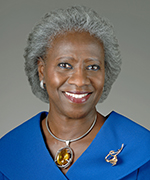From the Deputy Director for Intramural Research
Creating a More Diverse and Inclusive NIH

Michael Gottesman

Hannah Valantine

Roland Owens
Evidence indicates that heterogeneous groups of talented individuals, with experience in managing diversity, are better equipped to tackle complex problems than are homogeneous groups. It is also well documented that medical conditions are multidimensional and influenced by many factors such as race, genetics, gender, geography, socioeconomic status, and community values. Tackling these complex multivariable scientific and biomedical problems requires a vibrant culture of inclusive excellence that draws from a diversity of perspectives and experiences. As a testament to fostering such an environment, the NIH intramural research program (IRP) is recruiting talented scientists who also have experience in promoting and mentoring individuals who are from groups underrepresented in biomedicine.
There have always been individual NIH principal investigators (PIs) who have gone out of their way to make opportunities accessible to highly innovative biomedical researchers from underrepresented groups. To date, however, these PIs often worked in isolation and were therefore limited in their ability to promote an NIH-wide environment of inclusive excellence. This year, the IRP has begun a multi-year pilot, called the Distinguished Scholars Program (DSP), to create such an environment. The DSP is designed to create an annual cohort of 10 to 15 recently hired PIs (primarily at the tenure-track level) who have a commitment to promoting diversity and inclusion in the biomedical research workforce and trainee pool. The DSP scholars will become the focal point of a new mentoring and networking initiative led by the Office of Intramural Research (OIR) and the Scientific Workforce Diversity office (SWD). All NIH Institutes and Centers (ICs) with IRPs have contributed funds to help fund the DSP scholars.
This spring, the first cohort of 10 tenure-track investigators (TTIs) and three assistant clinical investigators (ACIs) representing seven ICs were selected as DSP scholars. All of them are expected to be on board by the end of September. These individuals were selected for the DSP because of their scientific accomplishments and because they have demonstrated a desire to be change agents. Each DSP cohort will have a year-long program of monthly activities designed to promote career development as well as interactions among DSP scholars, between DSP scholars and other IRP PIs, and between DSP scholars and NIH senior leaders. Embedded in the program will be four to five highly accomplished senior investigators, recruited to serve as mentors and sponsors for the DSP scholars. In addition to these activities designed to strengthen relationships among cohort members, DSP scholars will participate in a curriculum of professional-development and skill-building activities. These professional development activities will be open to all TTIs and ACIs.
The next deadline for applications will be early in Spring 2019. To assist with identification of DSP candidates in the future, the IRP will now include language in its PI-recruitment advertisements requesting applicants to include in their CVs a description of their mentoring and outreach activities, especially those involving women and individuals from groups underrepresented in biomedical research.
The success of the DSP program will be measured not only by the scientific success of the DSP scholars, but also by how they contribute to the transformation of the NIH IRP into an environment in which inclusive excellence is the norm, rather than the exception. We welcome your ideas about how to make the DSP program the best it can be, and we hope you participate fully by helping to recruit and make welcome scientific colleagues who will help us create a diverse and inclusive community that maintains NIH’s status as a top-tier biomedical research institution.
This page was last updated on Thursday, April 7, 2022
